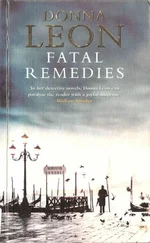Dottor Moretti took the opportunity of the ensuing silence to say, “Since we have no idea what is inside these trunks, whether papers or objects and of what kind, and since I suppose we are all curious, to one degree or another, to have a look, I propose we ask Dottoressa Pellegrini to open them so that we can see, and then we leave her to her work.” So saying, he made a gesture toward the chests.
This time, Caterina did not wait for them to answer. “That sounds eminently sensible,” she said and approached the smaller trunk. She went down on one knee, grabbed the lid on both sides, and pulled it up until it was suspended by her left hand. Holding it upright, she looked inside and saw the reason for its lightness: it was only half full. The string-tied packets of papers on the top layer looked as though they had been shifting about for centuries, as no doubt they had. But because they were tied in the same manner as the trunks, with separate pieces of waxed string running perpendicularly and horizontally, the piles had remained intact.
She lowered the lid and heard noises of protest from the people behind her. “Un momento,” she said and went back to her bag. From it, she took a pair of white cotton gloves, slipped them on, and returned to open the trunk again.
Caterina reached in and pulled out the top packet on the left side. She carried it to the desk and placed it upside down, then returned to the trunk to take a more careful look at the remaining papers. She had heard the others move closer and now she felt their presence around her. With them still there, she began methodically removing the papers from the left-hand stack and moving them to the table, where she turned each packet upside down on top of the others. That done, she started on the other pile and repeated the process. When the trunk was empty, the cousins leaned over and peered into it to assure themselves that it was.
Signor Scapinelli gave her a sideways glance, as if intending to check her sleeves, but then glanced away when she looked at him and took another look inside the empty trunk.
When the cousins appeared to have seen enough, Caterina methodically replaced the papers in the same order in which she had found them, leaving only the first packet she had removed, which she placed beside the keys.
Scapinelli looked at his watch, and Caterina could all but hear him thinking that it would soon be time to invite them to lunch. Hurriedly, she repeated the process of removing all of the papers in the second trunk. When it was evident that there was nothing but papers in this trunk, either, she replaced them and stepped back from the trunk. Dottor Moretti helped Stievani replace it at the back of the closet. Then they shifted the first one back into place in front of it.
Leaving the doors open, Caterina returned to the desk. She picked up the packet of papers and placed it on the other side of the desk, directly in front of the ex-director’s chair. Thus prepared for work, she turned her attention to the three men in the room. She moved the three keys together on the table. “Thank you for your help, gentlemen,” she said to Dottor Moretti and Signor Stievani.
“And now?” asked Signor Scapinelli, looking again at his watch, no doubt driven to it once more by the thought of the prices on the menus of nearby restaurants.
“I’m going home to have lunch,” Roseanna said.
“I have to meet a client,” Dottor Moretti said.
Signor Scapinelli said, “My son is waiting for me in his shop.”
And his cousin added, “I have to get a train.”
So strong was the temptation to sing, “ Io men vado in un ritiro a finir la vita mia” that Caterina had to press her fingernails into her palms to stop herself from doing it. When she recovered some semblance of calm, she pulled out the chair and said, “Then I think I’ll go to work.”
WHEN THEY WERE GONE, CATERINA SAT DOWN. HER JOB WAS beginning now, she told herself, conscious that, even as the trunks were being opened and the first papers removed, none of the people there had seen fit to mention Steffani’s name, though all of them knew it. The idea that either of the cousins could have an interest in Baroque music was absurd, and she knew nothing about Dottor Moretti beyond the elegance of his speech and dress. By her own admission, Roseanna was interested in a general sense in the music and the musicians of the period, but wisdom had kept her almost entirely silent during the meeting and the opening of the trunks. Thus, in all of this, she was the only person who took an interest in Steffani, at least as he was represented by his music. And what else mattered, really, after all this time?
He had been a priest. She recalled that he had also been mixed up in politics at the courts where he worked as a musician, but when were priests not mixed up in politics? He might well, then, have left the whole lot to the Church. Maybe the documents would tell, but why then would Propaganda Fide have sent them back?
She tipped her chair back and latched her hands behind her head, feeling no urge to look at the papers just yet. She wanted to think about the Big Things at work here. If she did find some sort of “testamentary disposition,” it would have little legal weight, not after three hundred years. Dottor Moretti must know this. “ Tanto fumo. Poco arrosto ,” she whispered aloud. There had indeed been a great deal of smoke: the suggestion that there had been other applicants for the job, the employment of a lawyer of Dottor Moretti’s apparent caliber, the many restrictions surrounding the work. What, then, would the roast be? Or what did they expect it to be?
Caterina looked around the room and wondered why Roseanna had not appropriated it. After all, it was unlikely that the Foundation would ever have another director.
“Pity you couldn’t be a singer,” she told herself aloud, as if having had the courage to choose that career would have led to something more exciting than this room and the weeks of reading that no doubt lay ahead of her. Rigorous honesty intervened here and warned her that her vocal talent would have taken her, with luck, as far as the chorus of the opera house of Treviso.
She let the front legs of the chair hit the floor and pulled the packet toward her, worked at the knot in the string that held it together until it came free, wrapped it into a neat oval around her fingers, and set it at a corner of the desk. Almost three hundred years and it was still unbroken and strong enough to be reused. The paper on the top was a letter written in Italian in a strongly Italianate hand. It bore the date 4 January 1710 and was addressed to “ Il mio fratello in Cristo Agostino. ” She lifted the paper by the top corners and held it to the light. She didn’t recognize the watermark, but the paper felt and looked right to justify the date.
Caterina had some trouble with the script, though none with the language or meaning. The letter made opening reference to the opera Tassilone, which the sender had had the immeasurable pleasure of seeing the previous year in Düsseldorf. Only now did the writer break in upon the creative genius of the composer, whose time he dared not waste, by sending his humble praise of a work in which were displayed both the highest moral principles and the most sublime manifestation of musical creativity.
She glanced up from the letter and tried to dig into the musical memories lodged in her scholar’s skull to get some sense of whether this was lickspittle flattery or honest praise. Steffani, she had once read, had introduced French fashions into Italian opera, a novelty imitated by that great borrower—to avoid using a different word—Handel.
The writer continued in this vein for another three paragraphs, detailing the “countless excellencies” of the work, the “sublime perfection” in the musical phrasing, and the “convincing moral principles” maintained by the text.
Читать дальше












